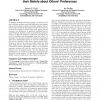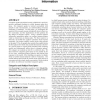27 search results - page 4 / 6 » Modeling Reciprocal Behavior in Human Bilateral Negotiation |
142
click to vote
AIED
2009
Springer
14 years 11 months ago
2009
Springer
Educational games may be particularly suited to teaching social learning skills with virtual humans. We investigate the importance of social goals and engaging social interactions ...
ATAL
2008
Springer
15 years 3 months ago
2008
Springer
As computerized agents are becoming more and more common, e-commerce becomes a major candidate for incorporation of automated agents. Thus, it is vital to understand how people de...
120
click to vote
ATAL
2008
Springer
15 years 3 months ago
2008
Springer
In strategic multiagent decision making, it is often the case that a strategic reasoner must hold beliefs about other agents and use these beliefs to inform its decision making. T...
101
Voted
P2P
2003
IEEE
15 years 7 months ago
2003
IEEE
Abstract—In this paper we explore the incentive and architectural issues that arise in Consortia of Peer-to-Peer Wireless Local Area Networks. A P2P WLAN Consortium (PWC) is a co...
115
click to vote
ATAL
2008
Springer
15 years 3 months ago
2008
Springer
Computer agents participate in many collaborative and competitive multiagent domains in which humans make decisions. For computer agents to interact successfully with people in su...


